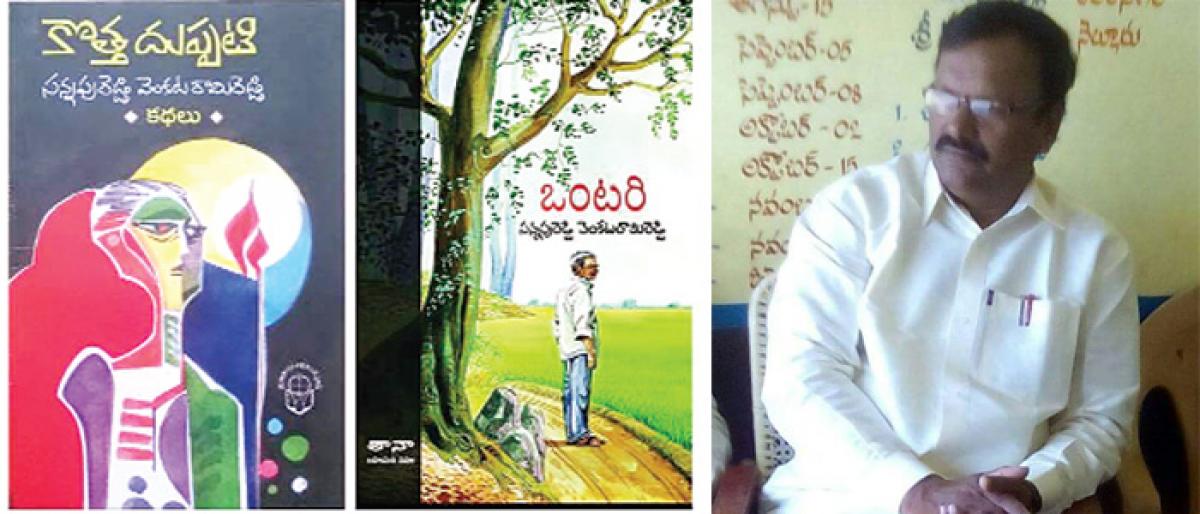Live
- Download Aviator App for Seamless Mobile Gaming
- Biden Pardon: Joe Biden Commutes Death Sentences of 37 Inmates, Including Child Killers and Mass Murderers
- South Korea: Yoon believes impeachment trial takes priority over martial law probe
- Strict Action for Non-Adherence to Time Management - DMHO Dr. Swarajya Lakshmi
- Over 13.29 lakh houses approved for rural poor in Maharashtra: Shivraj Chouhan
- District Collector Urges Timely Completion of Indiramma Housing Scheme Survey
- Digital Arrest Scam: Hyderabad Man Duped of ₹7 Lakhs by Fake Crime Branch Police Callers
- Sukhbir Badal seeks President's Police medal for officer who saved his life
- US Firm Accordion Acquires Merilytics, Launches 1,500-Seater Office in Hyderabad
- Free Medical Camp Organized by Alampur Advocate Bar Association
Just In

Sannapureddy Venkata Ramireddy is a typical and a true rural writer. All his literary works unveil the conscience of Indian villages particularly villages of Rayalaseema, Andhra Pradesh. He is a teacher by profession and a writer by heart and loves to live in the village.
Sannapureddy Venkata Ramireddy is a typical and a true rural writer. All his literary works unveil the conscience of Indian villages particularly villages of Rayalaseema, Andhra Pradesh. He is a teacher by profession and a writer by heart and loves to live in the village. He always picks the village storylines for his works and through that he ably represents the plight of the Rayalaseema ryots and the seasonal uncertainties that are toying with them. By living in the village environs both professionally and personally he effortlessly tries to portray the corroding essence of an Indian village and its philosophy.
He always exposed the vicious role of modernisation on all fronts that has significantly changed the village and its scenic beauty. This writer had observed the glorious past and the pathetic current situation closely with an intention to showcase the growing gap between past and current civilisation. He wrote around 100 poems, 75 stories, eight novels and two compilations namely ‘Kotha Duppati’ and ‘Batuku Sedyam’.
It is interesting to note that all his eight novels won various awards and accolades of Telugu literature. He has always tried to represent his village Sree Avadhutha Kasinayana Mandal, Kadapa district of Andhra Pradesh and its unique culture. His novels were taken as resource material for literary research.
His inimitable style of writing introduces the forgotten village vocabulary and makes us recollect our good old days that were spent in the lap of the village. His novels speak the contemporary truth and touch the social issues, which makes the village to lose its sheen.
His novel ‘Kadi', has won the accolades of the Telugu readers and bagged the ATA Award in 1998, represents the steep fall in the agrarian families due to the swift change in the agriculture due to mechanisation.
The novel ‘Pandavabeedu’, which has won the Swathi Weekly Award in 2002, is about the Rayalaseema faction and its effect on human relations. This novel highlighted the nobility of the people in the faction-ridden villages and their ground rules.
In his other work ‘Palagathe’, which has also won the Swathi Weekly Award in 2007, he made an unusual point with the help of his heroine Vyshali who enters into the Nallamala forest to extract a herb and to explore the Vannnuramma fort, which is located in the same forest as a remnant of the valour of Vannuramma.
‘Tholubommalata’, which bagged ATA first prize in 2007, primarily reveals about the adverse effect of technology on the traditional arts. In this novel, the septuagenarian Tirupataiah and his passion to protect “Bommalata” from extinction highlight the contemporary villages and their disarray.
‘Chinukula Savvadi’ is another beautifully woven love story between an ignorant and industrious youth Sivudu and Gowri, a girl from nearby town. This novel perfectly envisages the love between two innocent hearts in the midst of nature. This novel won the Chatura first prize in 2007 and is translated into English as ‘Sound of Rain Drops’ by Swatee Sripada.
His other novel ‘Okka Vana Chalu’ showcases the pathetic state of Rayalaseema’s farmer, who is compressed by nature and its uncertainties. This novel illustrates the sorrowful tales of farmers who have become as mute spectators to nature’s vicious sport. ‘Okka Vana Chalu’ bagged Navya Weekly Award in 2013.
It is noticeable that Sannapureddy’s works has always touched the traditional agricultural practices and the seasonal changes that bring a new look to nature. His another novel ‘Mabbulu Valani Nela’ portrays the failing state of agriculture in Rayalaseema and the government’s inept handling of the situation. This novel mirrors the farmer helplessness and the paradigm shift that has forced the ecology of villages. This novel won second prize in the 21st edition of ‘CPI Mahasabhalu’ that was held in Vizag.
His recent ‘ONTARI’ won the third prize at TANA and it deals with the ill effects of modernisation on man and villages. Venkata’s inimitable style of writing differentiates him with other novel writers and his pragmatic themes make every reader turn the pages more grippingly. It is very phenomenal he always chose his themes from his surrounding villages of Sri Avadhutha Kasinayana Mandal of Kadapa District and surely mentions the name of “Kasinayana” and his preaching in his novels. The readers always feel that his literary works are more familiar for them because they always mirror the glory of their past life.
By: E Gajendra Nath Reddy

© 2024 Hyderabad Media House Limited/The Hans India. All rights reserved. Powered by hocalwire.com







